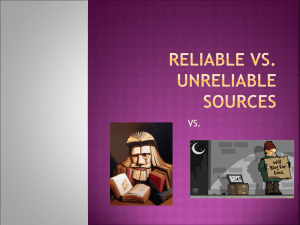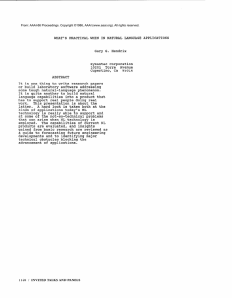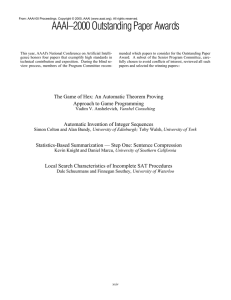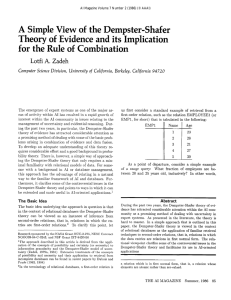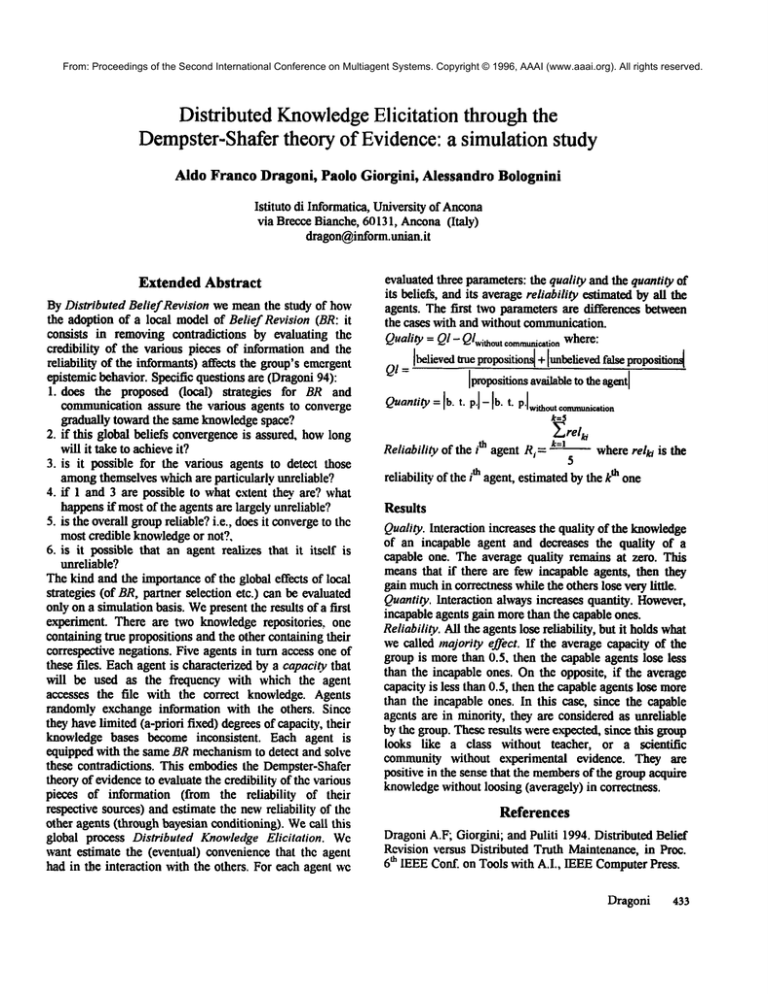
From: Proceedings of the Second International Conference on Multiagent Systems. Copyright © 1996, AAAI (www.aaai.org). All rights reserved.
Distributed Knowledge
Elicitation throughthe
Dempster-Shafer
theory of Evidence:a simulation study
Aldo Franco Dragoni, Paolo Giorgini,
Alessandro Bolognini
Istituto di lnformatica,Universityof Ancona
via BreeceBianche,60131,Ancona(Italy)
dragon@inform.unian.it
Extended Abstract
ByDistributed Belief Revision wemeanthe study of how
the adoption of a local modelof Belief Revision(BR: it
consists in removingcontradictions by evaluating the
credibility of the various pieces of informationand the
reliability of the informants)affects the group’semergent
epistemicbehavior.Specific questionsare (Dragoni94):
1. does the proposed (local) strategies for BR and
communicationassure the various agents to converge
gradually toward the sameknowledgespace?
2. if this global beliefs convergence
is assured, howlong
will it take to achieveit?
3. is it possible for the various agents to detect those
amongthemselveswhichare particularly unreliable?
4. if 1 and 3 are possible to whatextent the)" are? what
happensif mostof the agentsare largely unreliable?
5. is the overall groupreliable?i.e., doesit converge
to the
mostcredible knowledge
or not?,
6. is it possible that an agent realizes that it itself is
unreliable?
Thekind and the importanceof the global effects of local
strategies (of BR,partner selection etc.) can be evaluated
only on a simulationbasis. Wepresentthe results of a first
experiment. There are two knowledgerepositories, one
containingtrue propositionsand the other containingtheir
correspectivenegations. Five agents in turn access one of
these files. Eachagent is characterizedby a capacitythat
will be used as the frequency with which the agent
accesses the file with the correct knowledge.Agents
randomlyexchange information with the others. Since
they havelimited (a-priori fixed) degreesof capacity,their
knowledge bases becomeinconsistent. Each agent is
equippedwith the sameBR mechanism
to detect and solve
these contradictions. This embodiesthe Dempster-Shafer
theoryof evidenceto evaluatethe credibility of the various
pieces of information (from the reliability of their
respective sources) and estimatethe newreliability of the
other agents (throughbayesianconditioning). Wecall this
global process Distributed KnowledgeElicitation. We
want estimate the (eventual) conveniencethat the agent
had in the interaction with the others. For each agent we
evaluatedthree parameters:the quality andthe quantityof
its beliefs, andits averagereliability estimatedby all the
agents. Thefirst two parametersare differences between
the cases with and without communication.
Quality= Qi- Q/without
communication
where:
QI -
]believedtrue proposition~
+ lunbelieved
false proposition~
propositions
availableto the agent
an,,ty--Ib’
PI-Ib
t.PIwithoutomoio.,,on
k=5
E,e
Reliabilityof the i th agentR~-k=~_._L..__
whererelta is the
5
reliabili~" of the i th agent,estimatedbythe kth one
Results
Quality. Interaction increasesthe quality of the knowledge
of an incapable agent and decreases the quality of a
capable one. The average quality remainsat zero. This
meansthat if there are few incapable agents, then they
gain muchin correctnesswhilethe others lose verylittle.
Quantity. Interaction alwaysincreases quantity. However,
incapableagents gain morethan the capableones.
Reliability. All the agentslose reliability, but it holdswhat
wecalled majority effect. If the averagecapacity of the
groupis morethan 0.5, then the capableagents lose less
than the incapableones. Onthe opposite, if the average
capacityis less than 0.5, then the capableagentslose more
than the incapableones. In this case, since the capable
agents are in minority, the)’ are consideredas unreliable
by the group. Theseresults wereexpected,since this group
looks like a class without teacher, or a scientific
communitywithout experimental evidence. They are
positive in the sense that the members
of the groupacquire
knowledge
withoutloosing (averagely)in correctness.
References
DragoniA.F; Giorgini; andPuliti 1994.Distributed Belief
Revisionversus Distributed Truth Maintenance,in Proc.
6th IEEEConf. on Toolswith A.I., IEEEComputerPress.
Dragoni 433


